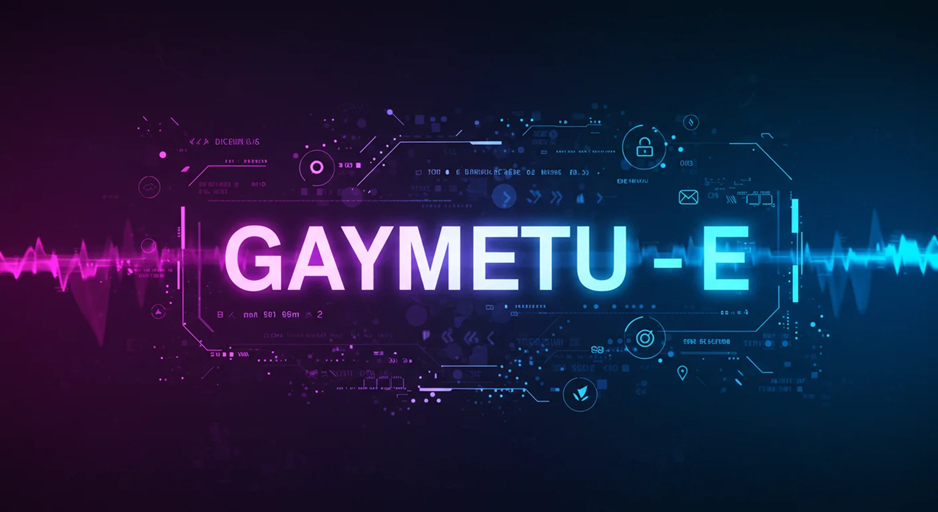Gaming has always been more than just pixels on a screen—it’s a powerful storytelling tool, a social connector, and a reflection of cultural evolution. For the LGBTQ+ community, it’s also been a battleground and a sanctuary. Enter Gaymetu e—a symbolic and growing movement that captures the spirit of queer representation, identity, and inclusion in the gaming universe.
In this article, we take a deep dive into the history, impact, and future of LGBTQ+ visibility in games through the lens of Gaymetu e, highlighting how far we’ve come, where we stand today, and why this movement matters more than ever.
What Is Gaymetu e?
At its core, Gaymetu e is more than just a buzzword. It’s a celebration of LGBTQ+ culture in the gaming world, combining “gay” and “game” with a unique twist that symbolizes the intersection of queerness and digital play.
While it may have started as an internet meme or a playful label, Gaymetu e has evolved into a meaningful banner under which queer gamers, developers, streamers, and fans unite to share their stories, advocate for inclusion, and foster safe spaces in an industry still grappling with representation.
Why LGBTQ+ Representation in Gaming Matters
For decades, the gaming industry mirrored broader cultural narratives—often dominated by cisgender, heterosexual, male protagonists. LGBTQ+ characters were either absent, misrepresented, or used as stereotypes. But in recent years, there’s been a conscious effort to change the narrative, with Gaymetu e emerging as a cultural movement to push for that change.
🔸 1. Representation Equals Visibility
When LGBTQ+ gamers see themselves reflected in playable characters, storylines, or communities, it sends a powerful message: You belong here.
🔸 2. Gaming as Identity Exploration
For many queer players, gaming is more than escapism—it’s a safe space to explore gender and identity through avatars, dialogue choices, or alternative worlds.
🔸 3. Inclusion Fosters Safer Communities
A game that welcomes diverse identities is more likely to attract inclusive, respectful players, reducing toxicity and discrimination online.
The Evolution of LGBTQ+ Characters in Games
Let’s rewind and track the journey of LGBTQ+ visibility in gaming, and how it helped shape what we now call Gaymetu e culture.
1980s–1990s: Stereotypes & Subtext
In early gaming, queer characters were rare or coded—often portrayed through flamboyant villains or exaggerated traits. Games like Final Fight or Streets of Rage included LGBTQ+ characters, but mostly as comic relief or negative stereotypes.
2000s: Hidden Identities and Firsts
- Titles like The Sims allowed same-sex relationships, giving players their first taste of freedom to express LGBTQ+ identities.
- Fable and Mass Effect introduced romance options, but still often kept queer storylines secondary or optional.
2010s–Present: Authentic Narratives
This decade saw the rise of powerful LGBTQ+ storytelling:
- The Last of Us Part II featured Ellie, a strong lesbian protagonist, marking a landmark moment.
- Life is Strange and its sequels tackled bisexuality, gender identity, and mental health with nuance and care.
- Dream Daddy, an indie visual novel, centered around queer dating in a humorous yet heartfelt way.
These titles, and many others, became cornerstones of Gaymetu e culture, highlighting how gaming can authentically reflect the queer experience.
Gaymetu e in Gaming Communities
While representation on-screen is crucial, Gaymetu e also thrives behind the scenes—in communities, content creation, and fan culture.
LGBTQ+ Streamers & Influencers
Platforms like Twitch and YouTube have become powerful tools for visibility. Creators like DEERE, Nikatine, CriticalBard, and many others are not just entertaining but also educating and advocating for queer voices in gaming.
They build inclusive spaces where identity and play coexist safely, bringing together fans who might not feel comfortable in mainstream gaming spaces.
Queer Game Developers
Indie developers have especially led the way in authentic LGBTQ+ storytelling:
- If Found…, a narrative game about a trans woman in Ireland
- Boyfriend Dungeon, where weapons become dates—regardless of gender
- We Know the Devil, a queer horror visual novel filled with symbolism and subversion
These creators are redefining what games can be—and Gaymetu e is the cultural stamp on their innovation.
Challenges LGBTQ+ Gamers Still Face
Despite progress, barriers remain in both the industry and community spaces.
Online Harassment
LGBTQ+ gamers and streamers often face targeted harassment, especially when openly discussing their identity.
Lack of Industry Diversity
Major studios still lack queer representation among leadership, meaning queer stories are often filtered through non-LGBTQ+ perspectives.
Tokenism vs. Authenticity
Including one LGBTQ+ character isn’t enough—what matters is depth, nuance, and integration into the story.
Gaymetu e is a response to these gaps, pushing the conversation forward.
The Importance of Safe Spaces
One of the most significant impacts of Gaymetu e is the creation of safe gaming environments:
- Discord servers, forums, and fan spaces where LGBTQ+ gamers connect
- Gaming events and conventions like GaymerX that celebrate queer culture
- In-game clans or guilds that explicitly support LGBTQ+ inclusion
These spaces are not about segregation—they’re about empowerment. In a world that can still be hostile, they offer relief, validation, and joy.
The Future of Gaymetu e and Queer Gaming
Looking forward, Gaymetu e represents more than a niche—it’s a transformative force in digital culture.
Trends to Watch:
- More trans and non-binary protagonists
- AI-generated stories that adapt to your gender/sexual identity
- Community-built games that reflect lived queer experiences
- Mainstream AAA titles embracing queer narratives by default, not exception
Words from the Community
“I didn’t know I needed to see a character like me until I played Tell Me Why. That game changed how I saw myself.”
— Kai, trans gamer and content creator
“Gaymetu e isn’t just about being gay and playing games. It’s about finding your people in a world where you feel seen.”
— Eliza, LGBTQ+ Twitch mod and advocate
Final Thoughts
As LGBTQ+ gamers, developers, and fans continue to shape the future of gaming, Gaymetu e stands as a beacon of resilience, creativity, and community.
Whether it’s through character representation, indie storytelling, streaming culture, or inclusive fan spaces, the message is clear: Queer voices belong in gaming—and not just as side quests.
So next time you pick up a controller, join a Discord chat, or boot up your favorite RPG, remember that behind the joystick is a world that’s richer and more colorful because of Gaymetu e.




